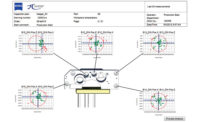The 2003 study, which measures problems reported by original owners of 2000 model-year vehicles at three years of ownership, finds that although there is near parity between domestic autos and European autos in initial quality, substantial quality gaps appear between the two in long-term durability. On average, models by domestic automakers outperform European automakers by 49 problems per 100 vehicles at three years of ownership. The market research firm did not disclose how many problems actually occurred.
“Conventional wisdom said that dependability was the property of the Japanese and Europeans,” says Joe Ivers, partner and executive director of quality/customer satisfaction at J.D. Power and Associates. “While that’s still true for automakers like Toyota and Honda, it’s no longer the case for many of the Europeans.”
“Porsche, Jaguar, Saab and BMW perform well above the industry average in dependability, but many other European brands are bought based on a reputation for long-term quality and fall far short of even the average,” Ivers says. “This is in stark contrast to the results of the first VDS, conducted in 1990, when Mercedes-Benz led the industry.” Also deteriorating more rapidly than the average vehicle are those by Audi and Volvo.
Toyota Motor Sales, U.S.A. Inc. boasts nine models with top segment rankings, followed by Ford Motor Co. and General Motors with three each, and American Honda and Porsche Cars North America with one each. Lexus is the top-ranked nameplate for the ninth consecutive year.
Porsche Cars North America leads the corporate ranking, while Toyota Motor Sales leads among the full-range vehicle manufacturers. GM is the only domestic manufacturer to rank above the industry average in the corporate rankings, with 12 models finishing in the top three of the segment rankings, second only to Toyota Motor Sales, with 13.
Some problems that occur more frequently as vehicles age include excessive brake wear, air conditioning-system issues, wind noise and the replacement of components not called for under the normal maintenance schedule. New problems that arise as vehicles age include issues with shocks and struts; faded, cracked or worn materials; worn or broken moldings; cracked and peeling paint; and various fluid leaks.
Long-term quality measures have a big consumer impact. Among new-vehicle buyers, 52% indicate that long-term durability is among their most important factors in choosing a vehicle. Further, among used-vehicle buyers, 42% report buying a used vehicle instead of a new vehicle because they felt that the quality of the used vehicle is as good as a new one.


